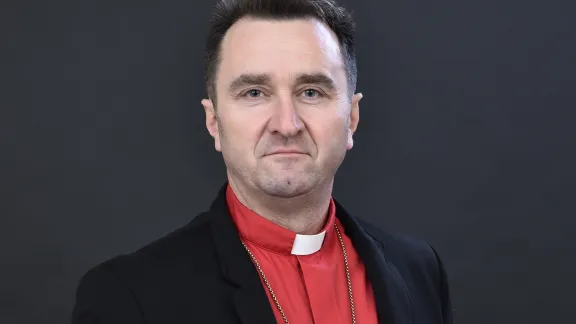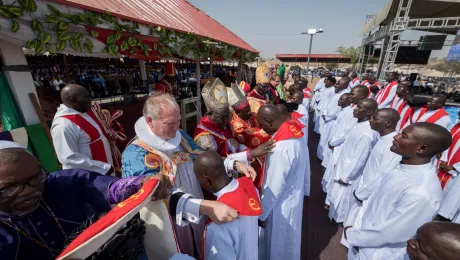
Bishop Jaroslav Javornik from the Slovak Evangelical Church of the Augsburg Confession in Serbia. Photo: SEAVC
Voices from the Communion: Jaroslav Javornik, Bishop of the Slovak Evangelical Church A. B. in Serbia
(LWI) - Dr. Jaroslav Javornik, Bishop of the Slovak Evangelical Church of the Augsburg Confession in Serbia (SEAVC), belongs to Serbian minority groups on two levels: as a member of the Slovak population and as a Lutheran Christian. “Freedom of faith and religion is one of the highest goods for us,” Javornik says.
In this interview, he talks about the power of faith, his church’s dynamic history, and its mission in today’s society.
Your installation as bishop on Reformation Day 2020 was already affected by the COVID-19 pandemic. You also had to postpone celebrations for the 100th church anniversary planned for June 2021. How are you and the SEAVC doing now?
My installation took place in a very modest setting: only the pastoral staff of our church and media representatives were present. That helped to ensure that the broader public could also participate in this important event.
Being the bishop of my church fills me with reverence and respect, and I strive to be a good coordinator and leader. Being first among equals - primus inter pares - brings with it much responsibility. It means being strict and demanding on oneself, but understanding, loving, and fair to others. I hope that God will use all the gifts invested in me to make me a blessed servant to the church. I wish to strengthen the weak because every chain is only as strong as its weakest link.
We are grateful to God for having protected us in these times and up to this point. We never imagined the challenges we would face during the planned celebrations for the 100th anniversary of the church. A pandemic is raging on a scale the world has not seen in centuries. It has changed our perceptions in a short time. And we are aware that even after the pandemic, the world will not be the same.
Nevertheless, we can thank God that we can adapt to preserve the lives of our neighbors. We changed our church activities: they often took place electronically, by telephone, or through video calls. We have even held two extraordinary online synods.
The history of Lutheran Christians in Serbia is quite turbulent. Could you briefly outline it?
The brothers Cyril and Methodius – also called the Slavic apostles – brought the Christian faith to our ancestors in the 9th century. One of their concerns was to preach the gospel to our people in understandable Slavic language. Even then, the desire to hear the good news in our own language was firmly rooted in our self-understanding. This spirit can also be found in the Bohemian theologian, preacher, and reformer Jan Hus (1370 -1415) and later in the reformer Martin Luther. Even today, in the year of the 100th anniversary of SEAVC’s independence, the Slovak language remains fundamentally important to us as a small but active community.
Slovak Lutheran Christians already settled in the territory of present-day Serbia 276 years ago. The Slovak language and the biblical message of faith were passed on from generation to generation during this long time. Today we enjoy the protection of the state and the respect of the Orthodox majority church.
This was not always the case, however. Until the Patent of Tolerance was issued 240 years ago, which allowed the free exercise of religion for the first time since the Counter-Reformation, there were devastating religious wars here and throughout Europe. And soon after the Tolerance Patent, Magyarization began in the Kingdom of Hungary between 1790 and 1918, aimed at assimilating minorities. This was done, among other things, through targeted reprisals against non-Hungarian population groups, a corresponding school policy, and the banning of languages other than Hungarian.
This background is essential for understanding the secession of the SEAVC in Serbia from the then Lutheran Church in Hungary in 1921. For more than eight years, inner-church disputes about the organization of our church continued until the first bishop Adam Vereš was installed on 18 September 1929.
In 2000 our church had 50,000 members. We suspect that the number has dropped significantly - we will know for sure after next year’s census. However, we see that many of our members are moving to Slovakia or other European Union countries. In addition, the birth rate is low, and the traditional understanding of the family and the attachment to the church are declining.
We currently have 20 male and four female pastors, a third of whom have already retired but are still helping out in the church. The church has four seniorates (deaneries), 29 parishes, nine filial parishes, and two diaspora areas.
Which people in your life have left a lasting impression on you?
I was seven years old when I saw my grandmother praying in the evening, kneeling by the bed. That was a strong testimony for me as a little boy and moved me deeply. I could not understand that she, an adult, needed help and asked for it on her knees. As a child, you think that only children need help and not grownups.
I grew up in Selenča in a traditional Lutheran farming family with a close connection to the church. In my heart, I carry the love of my mother, who always encouraged me. My father, who had only completed elementary school but always had a sound practical mind, taught me that honesty and diligence are values that will always have their price, irrespective of the field in which I would be involved.
Family is still central for me today, also to overcome personal and professional challenges. Family is where I recharge my batteries and which I jealously guard like the apple of my eye. I owe much of my life’s successes to my wife. She is the love of my life and my role model because she is deeply anchored in Jesus Christ and is the solid pillar of our family life.
What does it mean to speak Slovak and be Lutheran in Serbia today?
Two hundred and seventy-six years ago, our Slovak ancestors – driven by poverty and the hunger for religious freedom – found a new home north of the Danube in Vojvodina. Nevertheless, even today, many of our families know from which part of Slovakia they originate.
Also, the relations with the Evangelical Church of the Augsburg Confession in the Slovak Republic are close. Bishops from Slovakia ordain all our bishops. Our orders of worship, agendas, and hymnals are the same. Our pastors study at the Lutheran Theological Faculty of Comenius University in Bratislava.
Since we are a living branch of the Slovak people in Serbia, all activities take place in Slovak. However, we can have Serbian services at the request of individual families, mixed marriages, and urban church congregations.
Each of our parishes has a partner parish in Slovakia. For decades these connections have been maintained and strengthened. Thanks to these partnerships, our young people and groups of children could find refuge with families there during the bombings by the North Atlantic Treaty Organization (NATO) in 1999. We will continue to maintain and strengthen this cooperation because, as a minority church, we are too small to implement large projects in education, diaconia, or care for the elderly.
The Serbian government also takes good care of us; we enjoy all the rights that a minority group can have. Schools, universities, and media are open to us. We can speak our mother tongue and express ourselves freely. Above all, we have religious freedom. Being one of the traditional churches, we enjoy the respect of our government and are involved in all legislative procedures that affect our church.
In the 1990s, the Yugoslav Wars erupted in your region. What impact did these events have on the SEAVC?
The Slovak minority in Serbia always tried to be loyal to the respective government. And there were times when it was difficult to remain faithful to this attitude. One of them was during the wars in the 1990s. We lost young people – soldiers and members of our church communities – in that war. Many have asked why they had to die and what the purpose was in the first place.
Nevertheless, it is almost a miracle that the province of Vojvodina was not directly affected by the horror of the war. After all, 2 million people of 26 nationalities live here. The churches were full of people praying. Whether out of fear or piety, is hard to say. The important thing was to draw strength for life from God before the altar.
A planting campaign with old apple tree varieties took place in your church for the anniversary. What hopes and visions do you have for the SEAVC?
The project “100 years, 100 apple trees in every congregation” carries deep symbolism – for our church and our world threatened by climate change and other crises. It ties in with Martin Luther’s well-known saying: “Even if I knew the world would end tomorrow, I’d still plant an apple tree today!” We were able to make it happen thanks to the sponsorship of The Lutheran World Federation (LWF) and committed people.
I see the future of our church in every baptism of an infant. With joy, I pray each time: “Lord, I thank you that this child will continue to hear and live by your Word in its native Slovak language here in Vojvodina for the next 80 years.”
The SEAVC does not engage in missionary activities. We live amid an Orthodox society and see our church’s only calling and task to provide spiritual care for Slovak Lutheran Christians. This is what our constitution and the name “Slovak Lutheran Church” obliges us to do.
The only mission is to our children. Children born in families of our members should be baptized and become branches on the vine of Christ. They are to be educated in this faith, confirmed, and accompanied throughout their lives and together with their parents. While some churches strongly focus on the younger generation, we are also concerned with how best to care for our older brothers and sisters. Young people move out into the world looking for work, and parents stay home, often feeling abandoned. We see and understand this as a mission and mandate in the present time – the elderly also need our love and helping hand.
What does it mean for your church to be part of the global communion of Lutheran churches in the LWF?
We are proud of our Lutheran heritage, and we must pass it on to our children. Even though we are a minority in Serbia, both as Slovaks and as a Lutheran church, we are strongly encouraged through belonging to the large global Lutheran family. For this, we are incredibly grateful to God. Special thanks to the LWF and the German diaspora associations “Martin-Luther-Bund” and “Gustav-Adolf-Werk”; they have been supporting us with prayers as well as financially for more than 70 years.
By LWF/A. Weyermüller
The Lutheran World Federation is a global body that shares the work and love of Christ in the world. In this series, we profile church leaders and staff as they discuss topical issues and set out ideas for building peace and justice in the world, ensuring the churches and communion grow in witness and strength.


